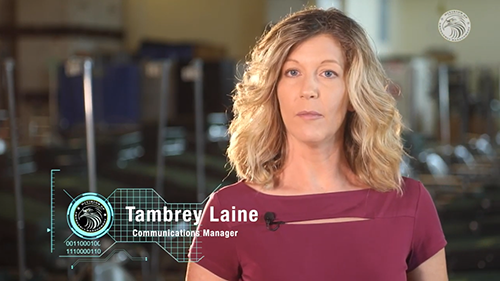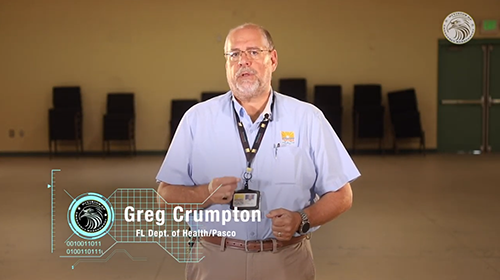It's a New Day in Public Health.
The Florida Department of Health works to protect, promote, and improve the health of all people in Florida through integrated state, county, and community efforts.
Special Needs Shelter
Florida Department of Health in Pasco County
- 727-619-0300
- Pasco.Web@FLHealth.gov
-
Mailing Address
7509 State Road 52
Hudson, FL
34667
Pasco County Special Needs Shelters
The Florida Department of Health in Pasco County has two special needs shelters:
- West Pasco Special Needs Shelter: Located at the Mike Fasano Regional Hurricane Shelter in Hudson.
- East Pasco Special Needs Shelter: Located at Wiregrass High School in Wesley Chapel.
A special needs shelter should be used as a place of last refuge. If the client has a caregiver, the caregiver MUST accompany the client and MUST remain with the client at the special needs shelter.
Resources
- Special Needs Shelter Fact Sheet (PDF, 316 KB) - English
- Special Needs Shelter Fact Sheet (PDF, 295KB) - Spanish
- Pasco County Disaster Preparedness Guide (PDF, 15.3 MB) - English
- Pasco County Disaster Preparedness Guide (PDF, 16.2 MB) - Spanish
- Pasco County Emergency Management
- Pasco County Evacuation Zones Map
- Pasco County Special Needs Registry
Registration versus Reservation
Register Online for a Special Needs Shelter
There’s been some confusion with the process of registering for a special needs shelter. Many people are under the impression that once they’ve registered, they’re automatically reserved a bed in the special needs shelter during an emergency such as a hurricane. Here’s what you need to know:
- Registration does NOT guarantee you a reservation at a special needs shelter.
- You must register BEFORE the hurricane season begins.
- If you are in an evacuation zone and have registered, Pasco County Emergency Management will contact you to confirm that you will be reporting to a special needs shelter.
- If needed, upon request, Pasco County Emergency Management will provide transportation to and from the special needs shelter.
Qualifications
*There is not enough space available at the shelter for caregivers to use air mattresses.
Who qualifies to be in a special needs shelter?
- Oxygen dependent
- Electrical dependent for medical equipment
- Insulin dependent diabetics who require minimal assistance
- Minor wound care dressing
- Memory impaired/dementia patients
Some examples of those who may not be suitable for a special needs shelter are:
- Tracheotomy patients
- Recent unstable cardiac patients
- Bed-bound patients
- Obese patients
- Ventilator patients
- High-risk pregnancy within four weeks of delivery or in active labor
What To Pack
* There is not enough space available at the shelter for caregivers to use their own air mattresses.
If a client is qualified and suitable for a special needs shelter, here’s what the client needs to bring with them during an evacuation:
- Caregiver
- Bed sheets, blankets, and pillow for client's bed
- Client’s prescription and non-prescription medication (with original bottle) needed for 7-30 days
- Supplies and medical equipment for the client’s care and the supply and equipment list from the home health agency
- Phone, pager, and emergency numbers for the client’s physician, pharmacy, and oxygen supplier (if applicable)
- Oxygen tanks and concentrator to get to and from the shelter safely
- CPAPs and nebulizers
- Name and phone number for the client’s home health agency
- Copy of the client’s plan of care
- Original yellow do not resuscitate (DNR) form signed by physician, if applicable
- Identification, current address and insurance card
- Special diet items (e.g. dialysis patients), non-perishable food for 7-10 days
- Glasses, hearing aids and batteries, prosthetics, walkers and/or wheelchairs, and any other assistive devices
- Personal hygiene items for 7-10 days
- Extra clothing for 7-10 days
- Flashlight and batteries
- Closed-toe shoes
- Self-entertainment and recreational items, like books, magazines, quiet games, etc.
Some important things to remember:
- If the client has a caregiver, the caregiver must accompany them, if possible.
- Caregivers who regularly assist the clients in the home are expected to continue to provide the same care in the shelter.
- Each caregiver will be provided a chair at their client’s bedside.
- Service animals are allowed in the shelter and may remain with their owners. Emotional support animals are also allowed in the shelter but will be housed in a separate shelter area; clients may spend time with their emotional support animals in this separate area. Please bring food, water, leash, and crate for your animal.
- Bring personal snacks, drinks and any special dietary foods for 7-10 days. It is possible only sparse meals will be provided.
- It tends to be cold in the shelter, so bring warm clothes, like a sweater or jacket, and an extra blanket for your caregiver.
- All items brought to the shelter must fit under your bed.
Preplanning is essential for everyone’s safety. Make your emergency plans BEFORE there’s an evacuation. Don’t wait until a hurricane is coming to register for a special needs shelter!






Connect with DOH